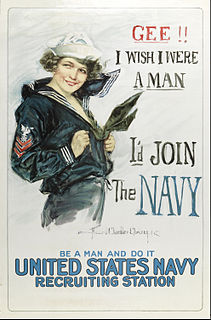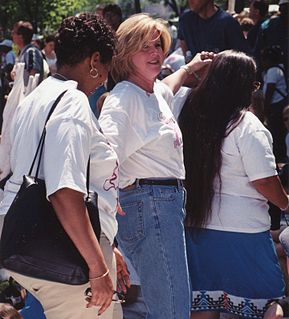See also
- Good Girls Don't Wear Trousers , 1989 novel by Lara Cardella
- Volevo i pantaloni (film), 1990 (also known as Good Girls Don't Wear Trousers and I Wanted Pants)
" Good Girls Don't " is a 1979 song by The Knack.
It may also refer to:

Cross-dressing is the act of wearing items of clothing not commonly associated with one's sex. Cross-dressing has been used for purposes of disguise, comfort, comedy, and self-expression in modern times and throughout history.

Shorts are a garment worn over the pelvic area, circling the waist and splitting to cover the upper part of the legs, sometimes extending down to the knees but not covering the entire length of the leg. They are called "shorts" because they are a shortened version of trousers, which cover the entire leg, but not the foot. Shorts are typically worn in warm weather or in an environment where comfort and air flow are more important than the protection of the legs.

A skirt is the lower part of a dress or a separate outer garment that covers a person from the waist downwards.

White tie, also called full evening dress or a dress suit, is the most formal in traditional evening western dress codes. For men, it consists of a black tail coat worn over a white dress shirt with a starched or pique bib, white piqué waistcoat and the eponymous white bow tie worn around a standing wing collar. Mid or high-waisted black trousers with galon, a braid of trim consisting of two silk stripes to conceal the outer seams of the trousers, along with court shoes complete the outfit. Orders, decorations and medals may be worn. Acceptable accessories include a black top hat, white gloves, a white scarf, a pocket watch, a white pocket square, and a boutonnière. Women wear full-length ball or evening gowns with evening gloves and, optionally, tiaras, jewellery, and a small handbag.
The posterior probability is a type of conditional probability that results from updating the prior probability with information summarized by the likelihood, through an application of Bayes' theorem. From an epistemological perspective, the posterior probability contains everything there is to know about an uncertain proposition, given prior knowledge and a mathematical model describing the observations available at a particular time. After the arrival of new information, the current posterior probability may serve as the prior in another round of Bayesian updating.

Business casual is an ambiguously defined Western dress code that is generally considered casual wear but with smart components of a proper lounge suit from traditional informal wear, adopted for white-collar workplaces. This interpretation typically including dress shirt and trousers, but worn with an odd-coloured blazer or a sports coat instead. Neck ties are optional in this category.

Suspenders, or braces are fabric or leather straps worn over the shoulders to hold up skirts or trousers. The straps may be elasticated, either entirely or only at attachment ends, and most straps are of woven cloth forming an X or Y shape at the back. Suspenders are typically attached to skirts and trousers with clips or buttons using leather tabs at the ends.

Leggings are several types of leg attire that have varied through the years. Modern usage from the 1960s onwards has come to refer to elastic close-fitting high-rise garments worn over the legs typically by women, such as leg warmers or tights. Usage from the 18th century refers to men's wear, usually made of cloth or leather that is wrapped around the leg down to the ankle. In the 19th century, leggings usually referred to infants' leg clothing that were matched with a jacket, as well as leg-wrappings made of leather or wool and worn by soldiers and trappers. Leggings prominently returned to women's fashion in the 1960s, drawing from the form-fitting clothing of dancers. With the widespread adoption of the synthetic fibre Lycra and the rise in popularity of aerobics, leggings came to further prominence in the 1970s and 1980s, and eventually made their way into streetwear. Leggings are a part of the late 2010s into the 2020s athleisure fashion trend of wearing activewear outside sporting activities and in casual settings.
Bishop Douglass Catholic School is a Roman Catholic co-educational secondary school and sixth form, situated in East Finchley area of the London Borough of Barnet, England. Its current Headmaster is Martin Tissot, a former pupil at the school.
Lara Cardella is an Italian writer. She is best known for her best seller novel Good girls don't wear trousers.

The uniforms of the United States Navy include dress uniforms, daily service uniforms, working uniforms, and uniforms for special situations, which have varied throughout the history of the navy. For simplicity in this article, officers refers to both commissioned officers and warrant officers.

A prison uniform is the standardized clothes worn by prisoners. It usually includes visually distinct clothes worn to indicate the wearer is a prisoner, in clear distinction from civil clothing.

Trousers or pants are a staple of historical and modern fashion. Throughout history, the role of trousers is a constant change for women. The first appearance of trousers in recorded history is among nomadic steppe-people in Western Europe. Steppe people were a group of nomads of various different ethnic groups that lived in the Eurasian grasslands. Archaeological evidence suggests that men and women alike wore trousers in that cultural context. However, for much of modern history, the use of trousers has been restricted to men. This norm was enforced in many regions due to social customs and laws. There are, however, many historical cases of women wearing trousers in defiance of these norms such as the 1850s women rights movement, comfort, freedom of movement, fashion, disguise, attempts to evade the gender pay gap, and attempts to establish an empowered public identity for women. Especially in the 20th and 21st centuries, the customs and laws restricting this manner of dress have relaxed dramatically, reflecting a growing acceptance and normalisation of the practice.

Mom jeans is a pejorative slang term for high-waisted women's jeans that were first fashionable in the late 1980s and early 1990s. In the late 1990s and 2000s they were mainly worn by adult American women and considered "old" by younger women. High rise, ankle length "mom jeans" have since become fashionable again in the 2010s and into the early 2020s with younger women from tween and teen aged girls, on up through college aged women and beyond.
Whickham School is a coeducational secondary school and sixth form located in Whickham in Tyne and Wear, England.

Trousers, slacks, or pants are an item of clothing worn from the waist to anywhere between the knees and the ankles, covering both legs separately. In the United Kingdom, the word pants generally means underwear and not trousers. Shorts are similar to trousers, but with legs that come down only to around the area of the knee, higher or lower depending on the style of the garment. To distinguish them from shorts, trousers may be called "long trousers" in certain contexts such as school uniform, where tailored shorts may be called "short trousers" in the UK.

Low-rise is a style of clothing designed to sit low on, or below, the hips. The style can also be called lowcut, hipster, or hip-hugger. and can apply to garments worn by males or females. The term can be applied to all garments that cover the wearer's crotch area, including trousers, jeans, shorts, skirts, panties, briefs, bikinis, pantyhose, and tights.
Motu Patlu is an Indian animated sitcom television series written by Niraj Vikram for Nickelodeon India. The series is produced by Cosmos-Maya Studios and Viacom 18. It is adapted from the classic comic strip Lotpot. It was premiered on 16 October 2012. It focuses on two friends, Motu and Patlu, living in a fictional town called Furfuri Nagar, however later in the series they live in another fictional city known as Modern City. In 2019, Motu Patlu and their friends were touring at Europe. Later in 2021, Motu Patlu and their friends started touring at Indian Places. Nowadays they live in New Modern City.

School uniform is a practice that dates to the 16th century in England. Charity schools such Christ's Hospital, founded in 1552 in London, were among the first schools to use a uniform for their students. The earliest documented proof of institutionalised use of a standard academic dress dates back to 1222 when the Archbishop of Canterbury ordered the wearing of the cappa clausa.

Volevo i pantaloni is a 1990 Italian coming-of-age drama film directed by Maurizio Ponzi. It is based on the bestseller novel Good Girls Don't Wear Trousers written by Lara Cardella. The film was a bomb at the Italian box office, grossing about one billion lire in spite of a budget of five billion lire.